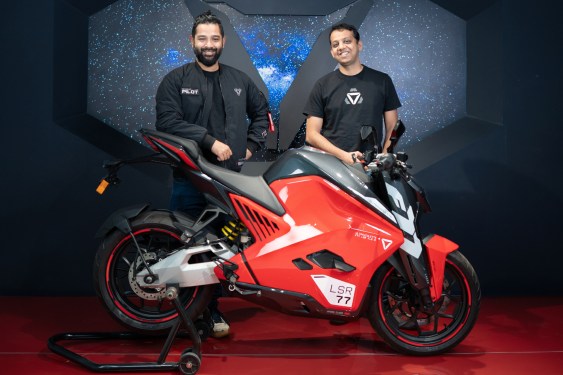Two months ago, Indian electric motorcycle startup Ultraviolette expanded into 10 European countries. Now, with $21 million in an all-equity round led by the corporate venture arm of Japanese electronics giant TDK Corporation, Ultraviolette is accelerating its expansion plans.
The nine-year-old startup aims to quadruple its European presence, enter motorcycle-driven markets like Latin America and Southeast Asia, and expand its portfolio to 14 models by early 2027. This global push follows the 2024 launch of its flagship F77 Mach 2 model and its second product, the F77 SuperStreet, in February.
Ultraviolette was founded by childhood friends Narayan Subramaniam, the CEO, and CTO Niraj Rajmohan. Combining their expertise in mechanical engineering, automotive design, computer science, and electronics, they set out to electrify the mid-segment two-wheeler market.
Inspired by Tesla, the duo launched Ultraviolette when India’s electric two-wheeler market was dominated by low-speed models catering to commercial needs. Early growth was fueled by low-cost Chinese imports, followed by homegrown startups and legacy manufacturers entering the space. Instead of competing in that race, Ultraviolette focused on building electric motorcycles that rival the performance of 150cc to 800cc internal combustion engine sports bikes.
The Bengaluru-based startup took four years from its 2016 inception to unveil its first model in 2019. After multiple design iterations, the seventh version—named F77—debuted with a fixed battery pack offering over 186 miles of range, a top speed of 96 miles per hour, 30kW peak power, and up to 100 newton-meters of torque.
Ultraviolette has also introduced the lightweight Shock Wave motorcycle and the Tesseract scooter, which features front and rear radars and cameras for assisted driving and blind-spot detection. The scooter is priced at ₹120,000 ($1,370), while its motorcycles start at ₹175,000 ($2,000) and go up to $10,000.
The company’s vehicles include eSIM connectivity and predictive maintenance powered by a proprietary diagnostics system, which can detect minor issues like chain lubrication needs. An accompanying app provides real-time insights to riders.
Ultraviolette operates a manufacturing facility in Bengaluru’s Electronics City with a capacity of 30,000 units. The company handles everything in-house, from embedded software and battery management systems to motor controllers and battery production. It employs 500 people, including 200 in corporate and R&D roles.
The founders shaped their business model by studying Tesla owners in the U.S., learning how the Model S stood out as a lifestyle statement. They aimed to replicate this with Ultraviolette, designing it as a global brand from the start. The name “Ultraviolette” was chosen for its universal appeal—”violet” is pronounced similarly in over 30 European languages, while “ultra” signifies cutting-edge innovation.
Unlike other Indian electric two-wheeler manufacturers focused on local demand, Ultraviolette pursued European certification early, reinforcing its global ambitions. India accounts for nearly 40% of global motorcycle sales, but most run on internal combustion engines. Expanding internationally is strategic, as India’s EV adoption remains low at 7.66%, compared to the global average of 16.48%. The country aims for 30% EV penetration by 2030, but progress suggests this may be ambitious.
India’s price-sensitive market makes high-end electric two-wheelers a challenge, as most buyers prioritize affordability over performance. Ultraviolette is targeting universal segments where demand is more consistent.
Looking ahead, Ultraviolette plans to expand its Bengaluru facility’s capacity to 60,000 units and establish a larger site to scale production to 300,000 units by early next year. It currently operates 20 stores across India and aims to reach 100 by March, with 50 new locations opening by the festive season.
In Europe, Ultraviolette has 40 dealers and expects significant scale-up next year. The startup also plans pilot programs in Latin America and Southeast Asia in 2025, followed by expansions into the U.S. and Japan.
To date, Ultraviolette has sold over 3,000 motorcycles in India and projects sales of 10,000 by year-end. It targets over $50 million in revenue this financial year and has raised approximately $75 million from investors including Qualcomm Ventures, Exor, and TVS Motor.

